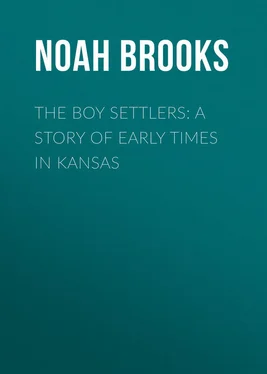Noah Brooks - The Boy Settlers - A Story of Early Times in Kansas
Здесь есть возможность читать онлайн «Noah Brooks - The Boy Settlers - A Story of Early Times in Kansas» — ознакомительный отрывок электронной книги совершенно бесплатно, а после прочтения отрывка купить полную версию. В некоторых случаях можно слушать аудио, скачать через торрент в формате fb2 и присутствует краткое содержание. Жанр: foreign_antique, foreign_prose, foreign_children, на английском языке. Описание произведения, (предисловие) а так же отзывы посетителей доступны на портале библиотеки ЛибКат.
- Название:The Boy Settlers: A Story of Early Times in Kansas
- Автор:
- Жанр:
- Год:неизвестен
- ISBN:нет данных
- Рейтинг книги:5 / 5. Голосов: 1
-
Избранное:Добавить в избранное
- Отзывы:
-
Ваша оценка:
- 100
- 1
- 2
- 3
- 4
- 5
The Boy Settlers: A Story of Early Times in Kansas: краткое содержание, описание и аннотация
Предлагаем к чтению аннотацию, описание, краткое содержание или предисловие (зависит от того, что написал сам автор книги «The Boy Settlers: A Story of Early Times in Kansas»). Если вы не нашли необходимую информацию о книге — напишите в комментариях, мы постараемся отыскать её.
The Boy Settlers: A Story of Early Times in Kansas — читать онлайн ознакомительный отрывок
Ниже представлен текст книги, разбитый по страницам. Система сохранения места последней прочитанной страницы, позволяет с удобством читать онлайн бесплатно книгу «The Boy Settlers: A Story of Early Times in Kansas», без необходимости каждый раз заново искать на чём Вы остановились. Поставьте закладку, и сможете в любой момент перейти на страницу, на которой закончили чтение.
Интервал:
Закладка:
Some of these passed through Dixon, and the boys gazed with wonder at the queer inscriptions that were painted on the canvas covers of the wagons; they longed to go with the immigrants, and taste the sweets of a land which was represented to be full of wild flowers, game in great abundance, and fine streams, and well-wooded hills not far away from the water. They had heard their elders talk of the beauties of Kansas, and of the great outrage that was to be committed on that fair land by carrying slavery into it; and although they did not know much about the politics of the case, they had a vague notion that they would like to have a hand in the exciting business that was going on in Kansas.
Both parties to this contest thought they were right. Men who had been brought up in the slave States believed that slavery was a good thing–good for the country, good for the slave-owner, and even good for the slave. They could not understand how anybody should think differently from them. But, on the other hand, those who had never owned slaves, and who had been born and brought up in the free States, could not be brought to look upon slavery as anything but a very wicked thing. For their part, they were willing (at least, some of them were) to fight rather than consent that the right of one man to own another man should be recognized in the Territories of Kansas and Nebraska. Some of these started at once for the debatable land; others helped their neighbors to go, and many others stayed at home and talked about it.
Mrs. Bryant, Oscar’s mother, said: “Dear me, I am tired and sick of hearing about ‘bleeding Kansas.’ I do wish, husband, you would find something else to talk about before Oscar. You have got him so worked up that I shouldn’t be the least bit surprised if he were to start off with some of those tired-looking immigrants that go traipsing through the town day by day.” Mrs. Bryant was growing anxious, now that her husband was so much excited about the Kansas-Nebraska struggle, as it was called, he could think of nothing else.
CHAPTER II.
THE FIRE SPREADS
One fine morning in May, Mr. Bryant was standing at his front gate watching for his brother-in-law, Mr. Howell, to come down the street.
He held a newspaper in his hand, and with this, loosely rolled, he was impatiently tapping on the gate as Mr. Howell drew near. Evidently something had happened to disturb him.
“See here, Aleck,” he exclaimed, as soon as his brother-in-law was within the sound of his voice, “I can stand this sort of thing no longer. I’m bound to go to Kansas. I’ve been thinking it over, and I have about made up my mind to go. Brubaker will take my store and the good-will of the concern. Oscar is wild to go, and his mother is perfectly able to take care of the house while I am getting ready for her to come out. What d’ye say? Will you go too?”
“Well,” said Mr. Howell, slowly, “you nearly take my breath away! What’s happened to stir you up so?”
“Just listen to this!” cried the other, “just listen!” and, unfolding his newspaper, he read, with glowing cheeks and kindling eyes, an account of an attack made by some of the “pro-slavery men,” as they were named, on a party of free-State immigrants who had attempted to cross the river near Kansas City. His voice trembled with excitement, and when he had finished reading, he asked his companion what he thought of that.
Mr. Howell looked pensively down the street, now embowered with the foliage of early summer, noted the peaceful aspect of the village, and the tranquil picture which gardens, cottages, and sauntering groups of school-children presented, and then said slowly, “I never was much of a hand at shooting, Charles, leastways, shooting at folks; and I don’t know that I could take steady aim at a man, even if I knew he was a Border Ruffian out gunning for me. But I’m with you, Charles. Charlie and Sandy can do a heap sight better in Kansas, after things get settled, than they can here. This place is too old; there’s too much competition, and the boys will not have any show if they stay here. But what does Amanda say?”
Now, Amanda was Mr. Bryant’s wife, Mr. Aleck Howell’s sister. When Aleck asked this question, the two men looked at each other for a moment, queerly and without speaking.
“Well, she’ll hate to part with Oscar; he’s the apple of her eye, as it were. But I guess she will listen to reason. When I read this piece in the paper to her this morning, at the breakfast-table, she was as mad as a wet hen. As for Oscar, he’s so fired up about it that he is down in the wood-shed chopping wood to blow off steam. Hear him?” And Mr. Bryant laughed quietly, notwithstanding his rising anger over the news of the day.
At that moment Sandy came whooping around the corner, intent on overtaking a big yellow dog, his constant companion,–Bose by name,–who bounded along far in advance of the boy. “See here, Sandy,” said his uncle, “how would you like to go to Kansas with your father, Oscar, Charlie, and myself?”
“To Kansas? shooting buffaloes, deer, Indians, and all that? To Kansas? Oh, come, now, Uncle Charles, you don’t mean it.”
“But I do mean it, my laddie,” said the elder man, affectionately patting the freckled cheek of the lad. “I do mean it, and if you can persuade your father to go along and take you and Charlie with him, we’ll make up a party–just we five–that will scare the Border Ruffians ’way into the middle of next year.” Then, with a more serious air, he added, “This is a fight for freedom, my boy, and every man and every boy who believes in God and Liberty can find a chance to help. I’m sure we can.” This he said with a certain sparkle of his eye that may have meant mischief to any Border Ruffian that might have been there to see and hear.
As for Sandy, he turned two or three hand-springs by way of relieving his feelings; then, having once more assured himself that the two men had serious thoughts of migrating to Kansas, he rushed off to the wood-shed to carry the wonderful news to Oscar. Dropping his axe, the lad listened with widened eyes to the story that Sandy had to tell.
“Do you know, Sandy,” he said, with an air of great wisdom, “I thought there was something in the wind. Oh, I never saw father so roused as he was when he read that story in the Chicago Press and Tribune this morning. Why, I thought he’d just get up and howl when he had read it out to mother. Jimmini! Do you really suppose that he will go? And take us? And Uncle Aleck? Oh, wouldn’t that be too everlastingly bully for anything?” Oscar, as you will see, was given to the use of slang, especially when under great excitement. The two boys rushed back to the gate, where the brothers-in-law were still talking eagerly and in undertones.
“If your mother and Aunt Amanda will consent, I guess we will go,” said Mr. Bryant, with a smile on his face as he regarded the flushed cheeks and eager eyes of Sandy and Oscar. Sandy’s father added: “And I’ll answer for your mother, my son. She and I have talked this thing over many a time, more on your account and Charlie’s than for the sake of ‘bleeding Kansas,’ however. I’m bound to say that. Every man is in honor bound to do his duty by the country and by the good cause; but I have got to look after my boys first.” And the father lovingly laid his hand on Sandy’s sturdy shoulder. “Do you think you could fight, if the worst comes to the worst, Sandy, boy?”
Of course the lad protested confidently that he could fight; certainly he could protect his rights and his father’s rights, even with a gun, if that should be found necessary. But he admitted that, on the whole, he would rather shoot buffaloes and antelope, both of which species of large game he had already learned were tolerably plentiful in Kansas.
Читать дальшеИнтервал:
Закладка:
Похожие книги на «The Boy Settlers: A Story of Early Times in Kansas»
Представляем Вашему вниманию похожие книги на «The Boy Settlers: A Story of Early Times in Kansas» списком для выбора. Мы отобрали схожую по названию и смыслу литературу в надежде предоставить читателям больше вариантов отыскать новые, интересные, ещё непрочитанные произведения.
Обсуждение, отзывы о книге «The Boy Settlers: A Story of Early Times in Kansas» и просто собственные мнения читателей. Оставьте ваши комментарии, напишите, что Вы думаете о произведении, его смысле или главных героях. Укажите что конкретно понравилось, а что нет, и почему Вы так считаете.












